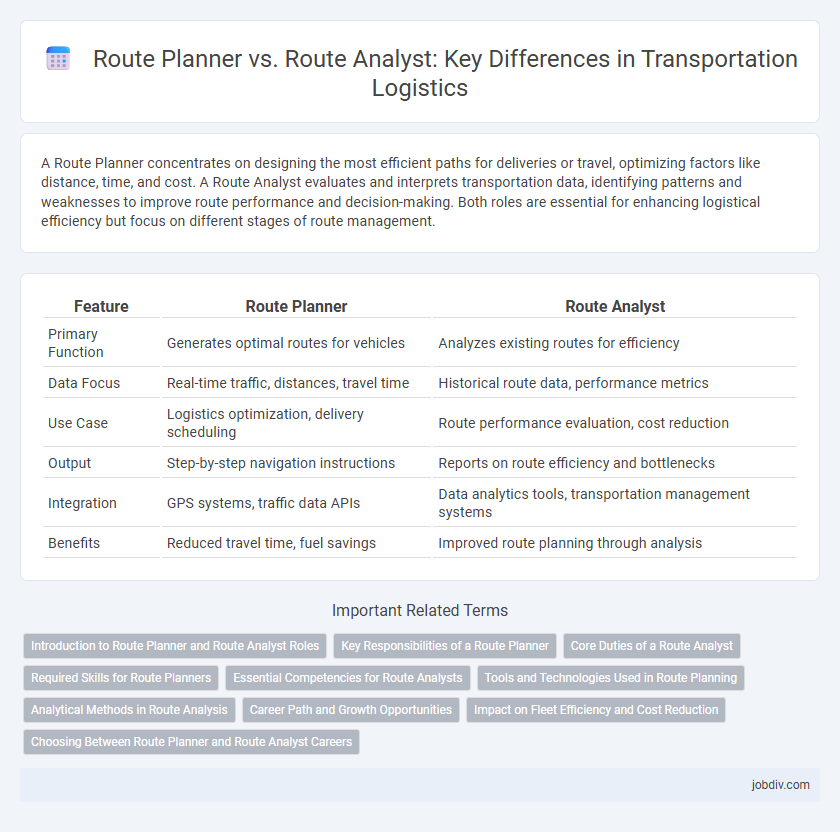A Route Planner concentrates on designing the most efficient paths for deliveries or travel, optimizing factors like distance, time, and cost. A Route Analyst evaluates and interprets transportation data, identifying patterns and weaknesses to improve route performance and decision-making. Both roles are essential for enhancing logistical efficiency but focus on different stages of route management.
Table of Comparison
| Feature | Route Planner | Route Analyst |
|---|---|---|
| Primary Function | Generates optimal routes for vehicles | Analyzes existing routes for efficiency |
| Data Focus | Real-time traffic, distances, travel time | Historical route data, performance metrics |
| Use Case | Logistics optimization, delivery scheduling | Route performance evaluation, cost reduction |
| Output | Step-by-step navigation instructions | Reports on route efficiency and bottlenecks |
| Integration | GPS systems, traffic data APIs | Data analytics tools, transportation management systems |
| Benefits | Reduced travel time, fuel savings | Improved route planning through analysis |
Introduction to Route Planner and Route Analyst Roles
Route Planner specializes in designing efficient travel paths by analyzing distance, traffic conditions, and delivery priorities to optimize time and cost. Route Analyst focuses on evaluating route performance through data analytics, identifying bottlenecks, and recommending improvements for increased operational efficiency. Both roles are crucial in transportation logistics, with Route Planners creating optimal routes and Route Analysts enhancing route effectiveness through performance insights.
Key Responsibilities of a Route Planner
A Route Planner primarily focuses on designing optimal routes by analyzing traffic patterns, distance, and delivery windows to ensure timely and cost-effective transportation. They coordinate with logistics teams to schedule shipments and optimize vehicle utilization, reducing fuel consumption and operational costs. Utilizing advanced mapping software and GPS data, Route Planners enhance route efficiency and improve overall supply chain performance.
Core Duties of a Route Analyst
A Route Analyst evaluates transportation routes by analyzing data such as traffic patterns, fuel consumption, and delivery times to optimize efficiency and reduce costs. Unlike a Route Planner who primarily designs route paths, the analyst uses advanced software and statistical tools to assess route performance and recommend improvements. Their core duties include forecasting demand, identifying bottlenecks, and providing actionable insights to enhance logistics operations.
Required Skills for Route Planners
Route planners require strong analytical skills, proficiency in geographic information systems (GIS), and expertise in logistics optimization to design efficient travel paths. They must understand traffic patterns, transportation regulations, and vehicle capabilities to develop cost-effective and timely routes. Effective communication and problem-solving abilities are essential to coordinate with drivers, clients, and stakeholders for seamless route execution.
Essential Competencies for Route Analysts
Route Analysts excel in data interpretation, spatial analysis, and optimization algorithms to enhance transportation efficiency. Their essential competencies include proficiency in Geographic Information Systems (GIS), advanced statistical tools, and real-time traffic data integration. Unlike Route Planners who focus on mapping and logistics, Route Analysts apply analytical skills to identify patterns and improve route performance systematically.
Tools and Technologies Used in Route Planning
Route Planner tools often utilize GPS navigation systems, geographic information system (GIS) software, and real-time traffic data APIs to optimize travel efficiency and minimize fuel consumption. Route Analyst platforms integrate advanced algorithms, big data analytics, and machine learning models to evaluate multiple route scenarios and predict traffic patterns for strategic decision-making. Both leverage cloud computing and mobile applications to enable dynamic route adjustments and enhance overall transportation logistics management.
Analytical Methods in Route Analysis
Route Planner employs heuristic algorithms and real-time traffic data to optimize travel paths for efficiency and time savings. Route Analyst utilizes advanced statistical models and geospatial analytics to evaluate route performance, congestion patterns, and infrastructure impact. Integrating predictive analytics and machine learning enhances decision-making in complex transportation networks.
Career Path and Growth Opportunities
A Route Planner focuses on optimizing travel itineraries using geographic data and mapping software, making it ideal for entry-level roles in logistics and transportation management with growth toward logistics coordination or supply chain roles. A Route Analyst utilizes advanced analytics, data modeling, and performance metrics to enhance route efficiency and cost-effectiveness, often requiring stronger analytical skills and offering career advancement into data science, operations management, or strategic planning within transportation firms. Both careers provide growth opportunities in technology-driven environments, but Route Analysts typically experience faster progression due to their data-centric expertise.
Impact on Fleet Efficiency and Cost Reduction
Route Planner optimizes daily fleet routes by minimizing travel distances and delivery times, directly reducing fuel consumption and operational costs. Route Analyst provides in-depth data analysis on route performance, identifying inefficiencies and enabling strategic adjustments for long-term cost savings. Combining both tools enhances fleet efficiency by streamlining real-time routing and leveraging analytics for continuous improvement in cost reduction.
Choosing Between Route Planner and Route Analyst Careers
Route Planner roles emphasize optimizing travel paths using geographic information systems (GIS) and real-time traffic data to improve efficiency and reduce costs in logistics. Route Analyst careers focus on data analysis and modeling to evaluate and predict route performance, identifying bottlenecks and recommending strategic improvements. Choosing between these careers depends on your preference for hands-on planning and operational execution versus data-driven insights and long-term transportation strategy development.
Route Planner vs Route Analyst Infographic

 jobdiv.com
jobdiv.com